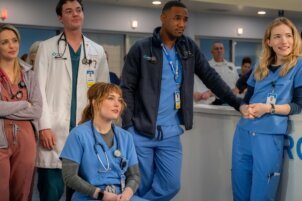With one-in-five people having a disability in the U.S. today, the lack of representation – just 2.2 percent of characters in the 100 top-grossing films of 2023 – means that millions of people are unable to see themselves reflected in media.
The 2025 Sundance Film Festival (January 23 – Feb 2) will provide an opportunity for audiences with various disabilities to see themselves represented – both in-person and virtually.
This year, several films feature disability in the plot. In particular, several films feature deafness: documentaries Deaf President Now! and Marlee Matlin: Not Alone Anymore, as well as short film Ragamuffin.
Additional films include features Come See Me in the Good Light, Life After, Third Act, Two Women, episodic BULLDOZER, and short films Out for Delivery, The Reality of Hope, The Things We Keep, Unholy, View From the Floor, among others.
Below please find a guide to several of the films featuring disability in the plot or talent with disabilities.
Feature (U.S. Documentary Competition): Marlee Matlin: Not Alone Anymore – Premieres January 23, 12:00 pm MT
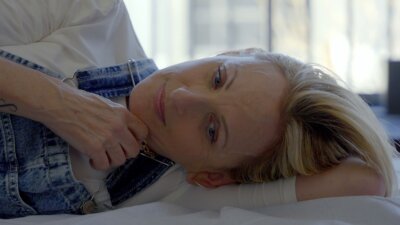 In 1987, Marlee Matlin became the first Deaf actor to win an Academy Award and was thrust into the spotlight at 21 years old. Reflecting on her life in her primary language of American Sign Language, Marlee explores the complexities of what it means to be a trailblazer. All screenings include open captions. Available online.
In 1987, Marlee Matlin became the first Deaf actor to win an Academy Award and was thrust into the spotlight at 21 years old. Reflecting on her life in her primary language of American Sign Language, Marlee explores the complexities of what it means to be a trailblazer. All screenings include open captions. Available online.
According to Sundance Film Festival programmer Ania Trzebiatowska, “Marlee Matlin: Not Alone Anymore feels like a full-circle moment. As a child, filmmaker Shoshannah Stern (director and producer) was inspired to believe that a deaf woman like herself could pursue a career as an actor after seeing Matlin win her Oscar. Stern’s directorial debut is an intimate, honest, and loving conversation between two profoundly connected people that weaves together Matlin’s first-person account with interviews from those who know her best.”
Short (Film Program 1): Unholy – Premieres January 23, 12:00 pm MT
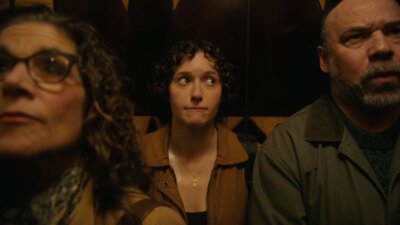
Photo by Kevin Xian Ming Yu.
Noa attends her family’s Passover Seder for the first time since being put on a feeding tube for a gastrointestinal disorder. There, she is confronted with pushy family members, malfunctioning medical devices, and a room of food she can’t eat. Open Caption screening on January 24 in Salt Lake City. Available online. Some films in this short film program contain strobe effects.
Short (Film Program 2): Out for Delivery – Premieres January 24, 12:00 pm MT

Photo by Gavin Velasquez Murray.
When terminally ill Joanna makes the difficult decision to pursue end-of-life options through the Death with Dignity Act, the systems set up to make her death peaceful and dignified yield the opposite. Open Caption screening on January 25 in Salt Lake City. Available online. Some films in this short film program contain strobe effects.
Short (Documentary): View From the Floor – Premieres January 25, 11:30 am MT
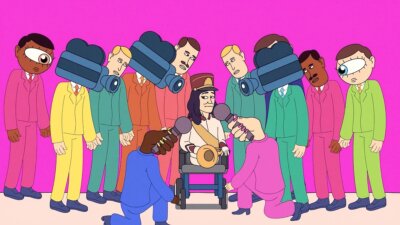
Photo by Joe Garber.
A singer confronts inspiration porn, exploitation, and impostor syndrome in pursuit of a life on the stage without legs. Open Caption screening on January 26 in Park City. Available online. This film offers audio description.
Short (Documentary): The Reality of Hope – Premieres January 25, 11:30 am MT
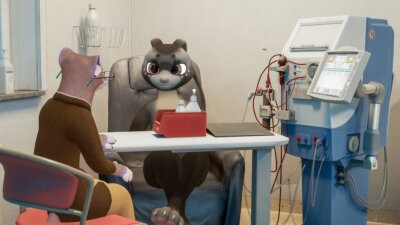
Photo by Joe Hunting.
Virtual reality creator Hiyu is facing kidney failure. His online friend Photographotter travels from New York City to Stockholm to be a live donor to Hiyu. Open Caption screening on January 26 in Park City. Available online.
Feature (Premieres, Documentary): Come See Me in the Good Light – Premieres January 25, 5:30 pm MT

Photo by Brandon Somerhalder.
Two poets, one incurable cancer diagnosis. Andrea Gibson and Megan Falley go on an unexpectedly funny and poignant journey through love, life, and mortality. Open Caption screening on January 31 in Park City. Only available in person. This film offers audio description.
Feature (World Cinema Dramatic Competition): Two Women – Premieres January 25, 10:30 pm MT
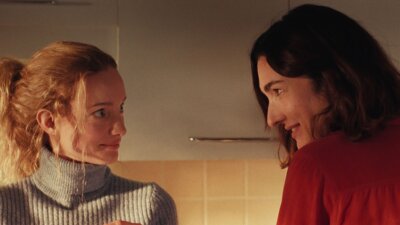
Photo by Sara Mishara.
Violette is having a difficult maternity leave. Florence is dealing with depression. Despite their careers and families, they feel like failures. Florence’s first infidelity is a revelation. When having fun is far down the list of priorities, sleeping with a delivery guy could be revolutionary. Open Caption screening on January 30 in Park City. Available online. This film is in French with English SHD subtitles.
Feature (U.S. Documentary Competition): Third Act – Premieres January 26, 4:00 pm MT
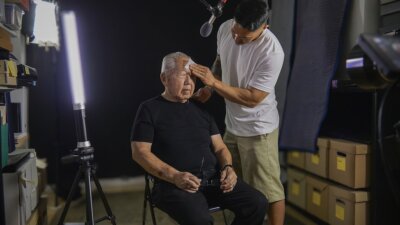
Photo by Tadashi Nakamura.
Generations of artists call Robert A. Nakamura “the godfather of Asian American media,” but filmmaker Tadashi Nakamura calls him Dad. Robert’s diagnosis of Parkinson’s disease leads to an exploration of art, activism, grief, and fatherhood. Open Caption screening on January 27 in Park City. Available online.
Short (Midnight): The Things We Keep – Premieres January 26, 11:55 pm MT
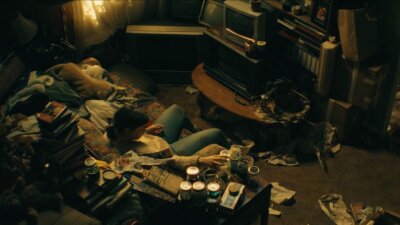
Photo by Daeil Kim.
Forced into a caretaker position, Kate comes home to pack up her estranged mother’s house. While struggling to clear her mother’s hoarded possessions, Kate discovers the insidious nature of her mother’s illness lying behind the house’s walls. Open Caption screening on January 28 in Park City. Available online. Some films in the Midnight short film program contain strobe effects.
Feature (U.S. Documentary Competition): Life After – Premieres January 27, 6:30 pm MT
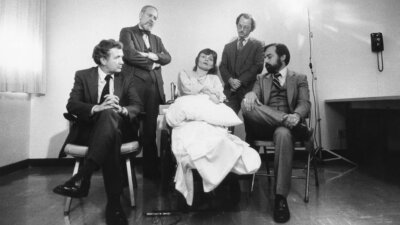
Photo by Los Angeles Times.
In 1983, a disabled Californian woman named Elizabeth Bouvia sought the “right to die,” igniting a national debate about autonomy, dignity, and the value of disabled lives. After years of courtroom trials, Bouvia disappeared from public view. Disabled director Reid Davenport narrates this investigation of what happened to Bouvia. Open Caption screening on January 30 in Salt Lake City and January 31 in Park City. Available online. This film offers audio description and has a photosensitivity warning.
Of note, Life After brings Reid Davenport back to Sundance after his 2022 Sundance Film Festival debut, I Didn’t See You There. According to Sundance Film Festival programmer Ash Hoyle, “Life After looks closely and critically at where progressive values of bodily autonomy and individual choice collide with latent fears of disability and an unequal value of the lives of disabled people.”
Short (Film Program 3): Ragamuffin – Premieres January 27, 9:30 pm MT
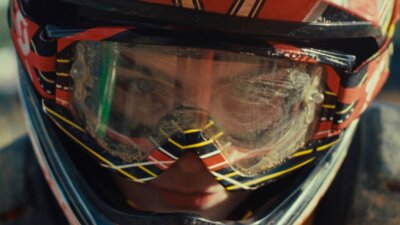
Photo by Jared Bedrejo.
A 12-year-old motocross racer spends what seems like an average race weekend at the track with her father. But as things unfold, she’s faced with her identity, her deafness, and what it means to be a girl. Open Caption screening on January 28 in Salt Lake City. Available online. Some films in this short film program contain strobe effects.
Feature (Premieres, Documentary): Deaf President Now! – Premieres January 28, 12:00 pm MT
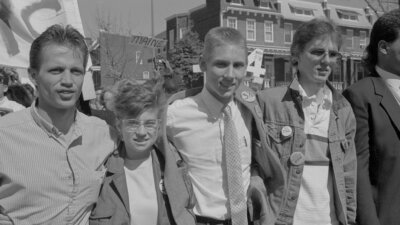
Photo by Jeff Beatty.
During eight tumultuous days in 1988 at the world’s only Deaf university, four students must find a way to lead an angry mob — and change the course of history. All screenings include open captions. Available online. This film offers audio description.
“Told primarily through American Sign Language, Deaf President Now! creates an immediacy through immersive archival footage and experiential use of silence and sound,” according to Sundance Film Festival programmer Basil Tsiokos. “Gallaudet alumnus, model, actor, and Deaf activist Nyle DiMarco (America’s Next Top Model) makes his directorial debut alongside veteran filmmaker Davis Guggenheim (Still: A Michael J. Fox Movie, 2023 Sundance Film Festival) with this rousing documentary that demonstrates the power of collective action to demand meaningful change, foster self-determination, and realize dreams long deferred.”
Episodic: BULLDOZER – Premieres January 28, 4:15 pm MT
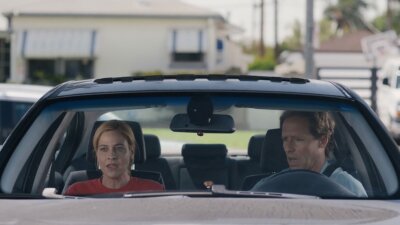 An undermedicated, chronically impassioned young woman lurches from crisis to crisis of her own making. Open Caption screening on January 29 in Park City. Available online. This series is part of a larger episodic showcase, which has a photosensitivity warning.
An undermedicated, chronically impassioned young woman lurches from crisis to crisis of her own making. Open Caption screening on January 29 in Park City. Available online. This series is part of a larger episodic showcase, which has a photosensitivity warning.
Other films that may touch on disability include Andre is an Idiot (U.S. Documentary Competition), which premieres on January 24 at 11:30 am MT, with an open caption screening on January 26 in Salt Lake City. In this film, Andre is dying because he didn’t get a colonoscopy. If I Had Legs I’d Kick You (Premieres) premieres January 24, at 2:15 pm MT, with an open caption screening on January 31 in Park City. In this film, Linda has a child with a mysterious illness. Similarly, the midnight short film Bunnyhood about a hospital visit premieres on January 26 at 11:55 pm MT, with an open caption screening on January 28 in Park City.
Talent with Disabilities
When actors and directors disclose a nonapparent disability, such as a learning disability or mental health condition, they help normalize these disabilities in both the entertainment industry and for the general public who consume their content.
Multiple directors identify as disabled. In some cases, the subject of their film is related to their disability. For example, Marlee Matlin: Not Alone Anymore Director and Producer Shoshannah Stern and Deaf President Now! Director and Producer Nyle DiMarco are both deaf while Life After Director Reid Davenport and Director and Producer of View From the Floor Mindie Lind have physical disabilities. Likewise, Unholy Writer-Director Daisy Friedman is a multi-organ transplant who dealt with similar circumstances as her protagonist.
In other cases, however, the filmmaker’s disability is not connected to the film’s content. For example, Director and Producer Kim A. Snyder of The Librarians has chronic fatigue syndrome. Director Ahmir “Questlove” Thompson of SLY LIVES! (aka The Burden of Black Genius is autistic. Sugar Babies Director Rachel Fleit was diagnosed with alopecia when she was 18 months old. She previously directed Introducing, Selma Blair, which was nominated for a Critics Choice Award for Best Documentary Feature.
In some cases, disabled actors appear in films that do not necessarily have disability in the plot. In many of these instances, actors with disabilities are playing roles that have nothing to do with their disability.
- Alex Wolff (Magic Farm) has Tourette’s syndrome.
- Hope Giselle (BLKNWS: Terms & Conditions) has spoken openly about experiencing suicidal ideation in response to bullying during her freshman year of college.
- Ian Gelder (Sweetheart) died of complications from bile duct cancer in May 2024 at the age of 74.
- John Magaro (Omaha) has publicly spoken about having anxiety.
- Lili Reinhart (Hal & Harper) had depression and anxiety, and currently has alopecia.
- Mark Ruffalo (Hal & Harper) had a tumor and surgery to remove the tumor resulted in temporarily paralysis and deafness in his left ear.
- Milly Shapiro (Em & Selma Go Griffin Hunting) was born with cleidocranial dysostosis.
- Mindy Sterling (Such Good Friends) was diagnosed with breast cancer in 1998. Following treatment, she has remained cancer-free.
- Naveen Andrews (Last Days) has spoken about his alcoholism and his two-year addition to heroin in the mid-1990s.
- Scoot McNairy (East of Wall) is dyslexic.
Additional research conducted by Eric Ascher. All photos courtesy of Sundance Institute.

